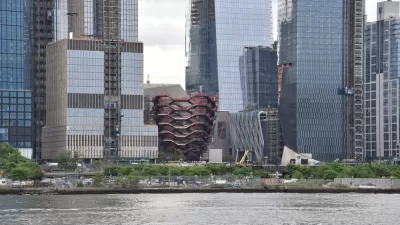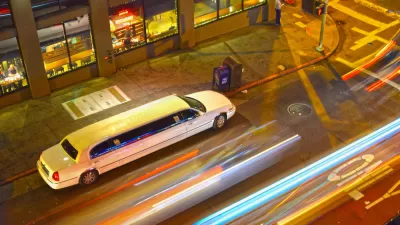The humble curb is getting crowded: not only with new modes of transportation, but also with a slew of new data tools aiming to keep track of it all.

Andrew Small and Laura Bliss report on an increasingly active space: data platforms providing real-time information on how curbs are being used. They include Open Curbs, a tool from Sidewalk Labs spinoff Coord, "which pins the locations of wheelchair cuts, fire hydrants, bus stops, and other physical assets that define the curb to digital maps, available to anyone who's interested in using them."
The idea is to give public officials, mobility companies, and researchers a better picture of what's going on in a space that, according to Coord CEO Stephen Smyth, remains "relatively un-digitized." Many of these startups focus on the often-fraught nexus between new mobility companies and the public sector. For instance, a tool from data company Populus "gives cities access to parking data from e-scooters and e-bikes operated by private companies." Another, from transit data startup Remix, provides data visualization and analysis options.
On the public end, the Los Angeles Department of Transportation is experimenting with its own API that obtains real-time trip data from private scooter companies. This lets the city "understand where vehicles are distributed across the city, and to adjust and enforce regulations for private mobility companies directly through their apps."
While many see potential in smarter systems for curb management, Small and Bliss write that "the new, data-oriented products that aim to pave over conflicts at the curb are also raising new conflicts about privacy and governance of public space."
FULL STORY: The Race to Code the Curb

Planetizen Federal Action Tracker
A weekly monitor of how Trump’s orders and actions are impacting planners and planning in America.

Map: Where Senate Republicans Want to Sell Your Public Lands
For public land advocates, the Senate Republicans’ proposal to sell millions of acres of public land in the West is “the biggest fight of their careers.”

Restaurant Patios Were a Pandemic Win — Why Were They so Hard to Keep?
Social distancing requirements and changes in travel patterns prompted cities to pilot new uses for street and sidewalk space. Then it got complicated.

DC Area County Eliminates Bus Fares
Montgomery County joins a growing trend of making transit free.

Platform Pilsner: Vancouver Transit Agency Releases... a Beer?
TransLink will receive a portion of every sale of the four-pack.

Toronto Weighs Cheaper Transit, Parking Hikes for Major Events
Special event rates would take effect during large festivals, sports games and concerts to ‘discourage driving, manage congestion and free up space for transit.”
Urban Design for Planners 1: Software Tools
This six-course series explores essential urban design concepts using open source software and equips planners with the tools they need to participate fully in the urban design process.
Planning for Universal Design
Learn the tools for implementing Universal Design in planning regulations.
Heyer Gruel & Associates PA
JM Goldson LLC
Custer County Colorado
City of Camden Redevelopment Agency
City of Astoria
Transportation Research & Education Center (TREC) at Portland State University
Camden Redevelopment Agency
City of Claremont
Municipality of Princeton (NJ)





























